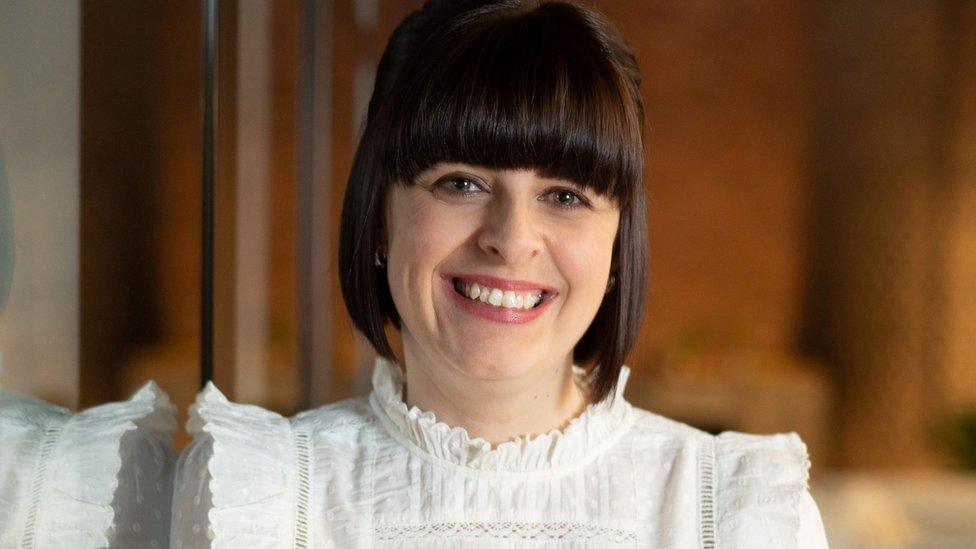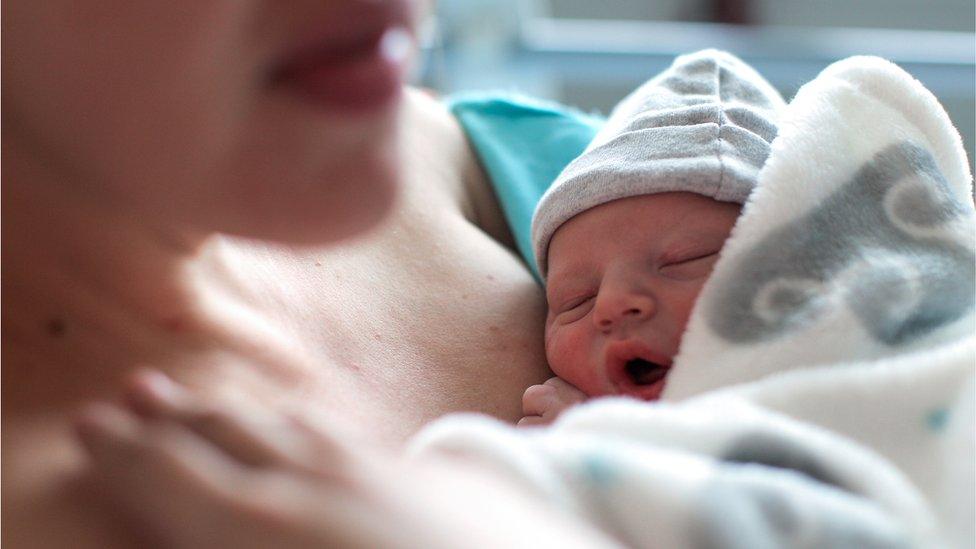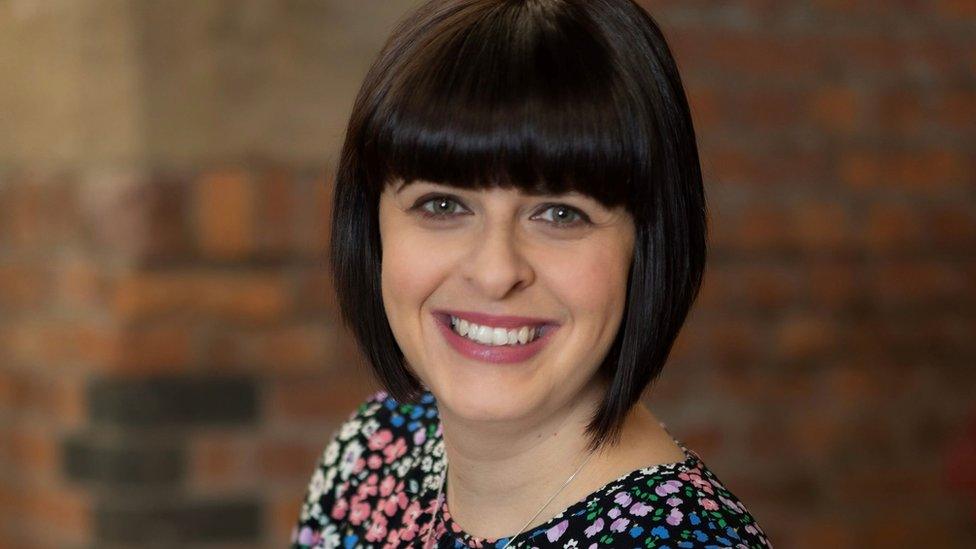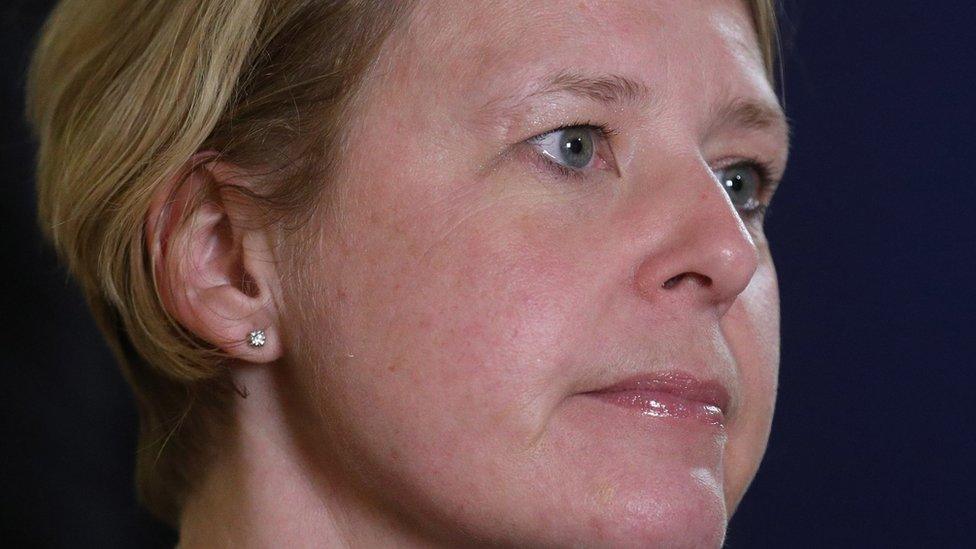Leicestershire mum campaigns for workplace fertility rights
- Published

A mum is calling for more workplace rights for people undergoing fertility treatment.
Becky Kearns, from Bottesford in Leicestershire, underwent five rounds of failed IVF treatment before having three children through egg donation.
She is supporting a private members' bill brought by MP Nickie Aiken, calling for a right to paid time off, which is due to be heard later.
The government said it welcomed supportive employers.

Becky says her employer was supportive but people working for other companies had a less positive experience
Ms Kearns, 36, said her employer was supportive while she was undergoing fertility treatment for her six-year-old daughter and four-year-old twins after going through an early menopause.
However, she was aware that many employers were less understanding.
She said: "People are having to hide the fact they are going through fertility treatment and going off sick because they feel that they just can't tell their employer."
Ms Kearns has set up an organisation called Fertility Matters at Work.
She is also working with MP Nickie Aiken, who has brought a private members' bill aimed at putting in place a statutory right for time off for people going through fertility treatment.

Becky had her three children through egg donation after five rounds of failed IVF treatment
"What we are trying to do is introduce a level of awareness and some education and training for employers so that they are aware of how to support people who are going through this life event," she said.
"We are hoping that employers will take note and really realise this something that they need to be supporting their people through.
"There is a huge number of people in workplaces that will be going though this but often in silence."
The campaigners said that while legal provision existed to allow women to attend antenatal appointments, there is nothing to protect women from unfair treatment if they need time off for IVF appointments.
They also pointed out that the situation did not just affect heterosexual couples but also single people and LGBTQ+ families who may rely on fertility treatment to start a family.

Helen, Becky and Steph are calling for better options for employees
Steph Lane, 31, a clinical psychologist from Arnold in Nottinghamshire, is also supporting the campaign.
She has a 10-month-old daughter who was born through IVF.
She said she did not feel supported by her employers, the NHS, while she was undergoing treatment.
"Where I worked at the time, there was a real misunderstanding about what fertility treatment is and what men and women have to go through," she said.
"The service I was working in really struggled to understand.
"My feeling was that I couldn't do both [work and undergo fertility treatment] because of the emotional and physical intensities of IVF and my job.
"I felt it was necessary to take sick leave.
"But I do think if there was another option or better policy provision for employees, I would not have needed to to do that."

On the rise

About 60,000 patients in the UK have fertility treatment every year.
About one in 34 of all children born in the UK in 2019 were conceived using IVF.
About 30 years ago, there were under 7,000 IVF cycles; today there are around 70,000 and success rates have increased from 7% to 24%.
In total, there have been around 1.3 million IVF cycles and over 260,000 donor insemination (DI) cycles, resulting in around 390,000 babies born.
Source: Human Fertilisation and Embryology Authority (HFEA)

The campaigners said they understood some businesses might find such protection onerous at a time when they might be struggling to survive.
But they said it was important to remember it was a temporary adjustment that could make a big difference to an individual employee.

Becky Kearns says many employees will be going through the treatment in silence
Helen Burgess, 42, an employment lawyer from Southwell, Nottinghamshire, said she was helping her firm put together a policy to support workers undergoing fertility treatment.
She has two children - one, now aged six - and said she had set up support at a previous employer after feeling very alone while undergoing IVF.
"It was so difficult on that mental rollercoaster," she said.
"If I could have had the support of someone to talk to, it would have made it so much easier.
"Fertility treatment can be physically psychologically and financially draining.
"There's growing momentum to open up a conversation in the workplace and make sure it's not a taboo subject."

Nickie Aiken MP is bringing a private members' bill which she hopes will help people undergoing treatment
The second reading of the Fertility Treatment Employment Rights Bill, brought by MP Nickie Aiken, is due to be heard later.
She said: "Fertility treatment... is emotionally draining, costly, risky and a long process.
"Undergoing treatment while juggling a career is very tough.
"Many people feel they cannot tell their employer for fear of being overlooked for a promotion or being made redundant.
"The number of people hiding it from their employer and taking sick leave is shockingly high. It's no wonder more than a third have considered quitting their job.
"This must change. Individuals and couples need the right to attend fertility appointments no matter where they work, without fear of being negatively impacted in their career."
She said the bill set out the right for employees to take the time off for fertility treatment, just like they would for antenatal appointments.
A Department for Business, Energy and Industrial Strategy spokesperson said: "Many employers compassionately support people going through fertility treatment, and the government welcomes those that go beyond the statutory minimum."

Follow BBC East Midlands on Facebook, external, Twitter, external, or Instagram, external. Send your story ideas to eastmidsnews@bbc.co.uk, external.
- Published3 July 2022
